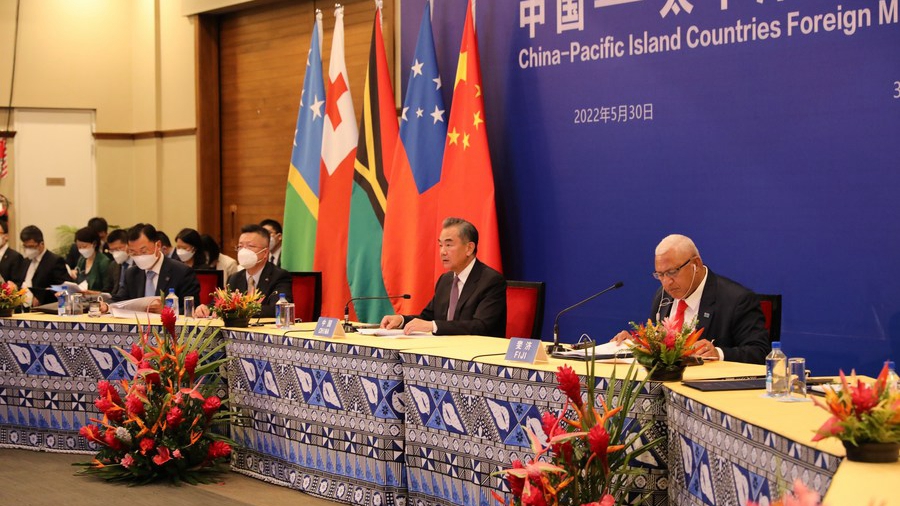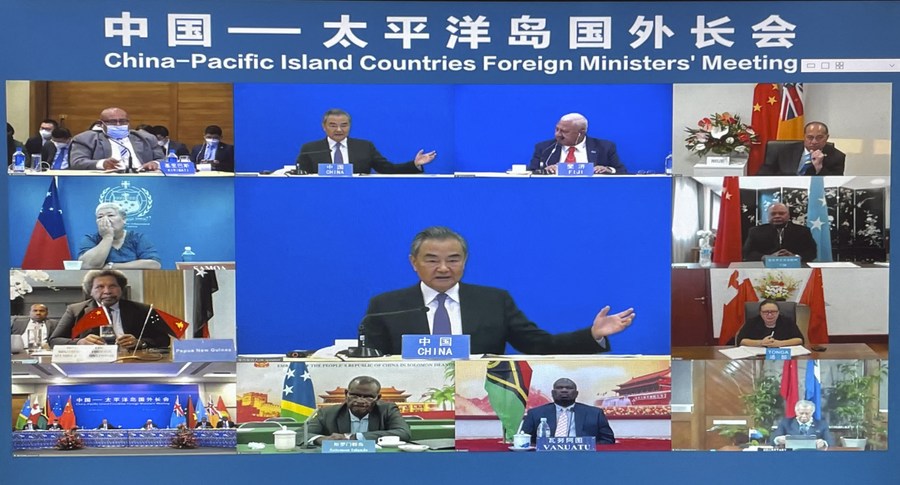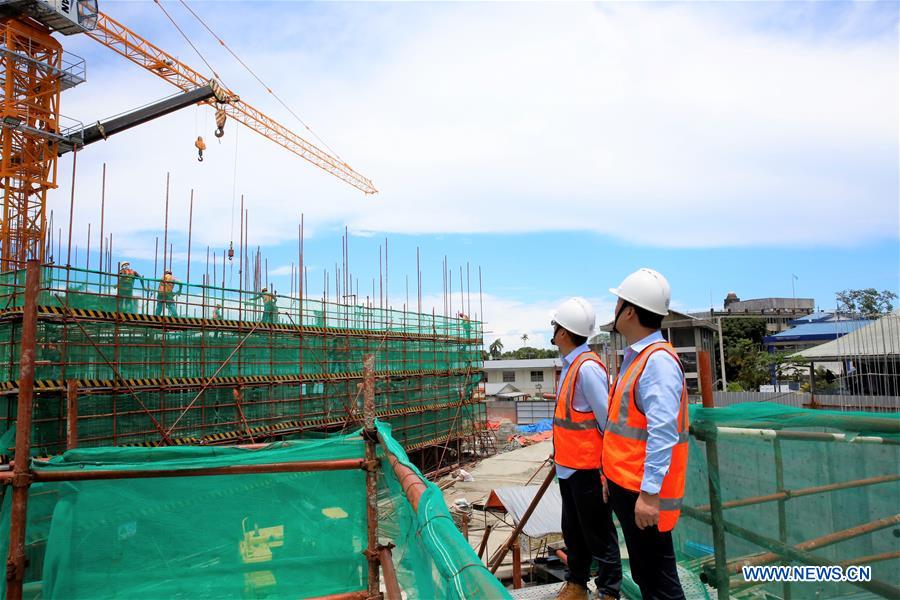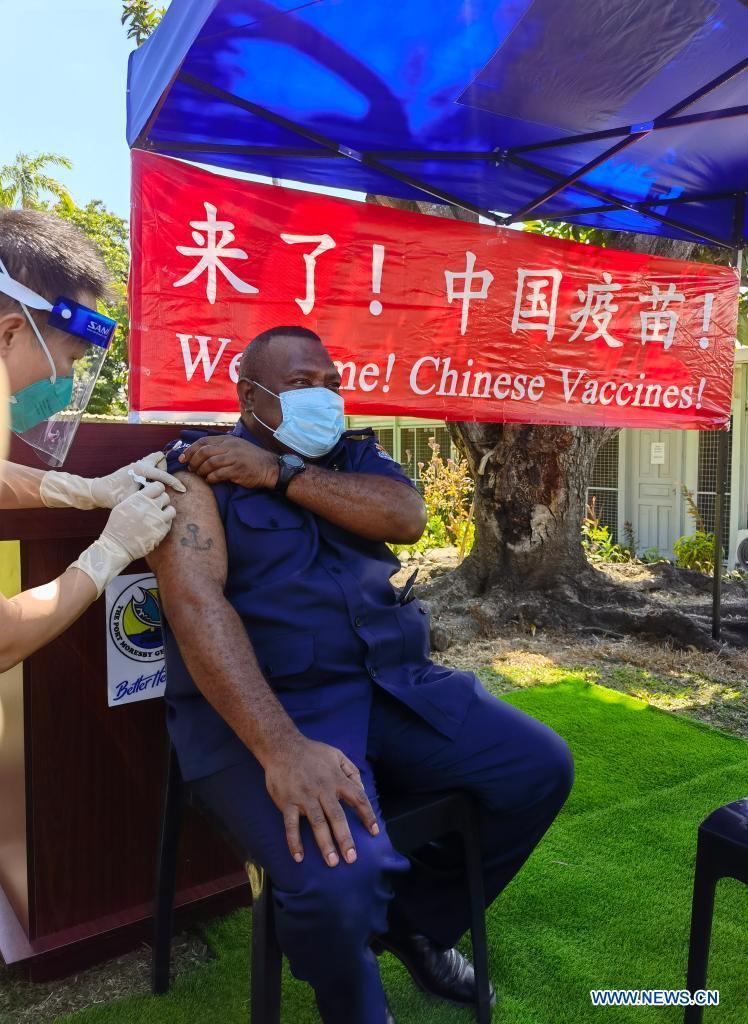
Chinese State Councilor and Foreign Minister Wang Yi (2nd R) co-hosts the second China-Pacific Island Countries Foreign Ministers' Meeting with Fijian Prime Minister and Foreign Minister Voreqe Bainimarama (1st R) in Suva, Fiji, May 30, 2022. /Xinhua
Chinese State Councilor and Foreign Minister Wang Yi (2nd R) co-hosts the second China-Pacific Island Countries Foreign Ministers' Meeting with Fijian Prime Minister and Foreign Minister Voreqe Bainimarama (1st R) in Suva, Fiji, May 30, 2022. /Xinhua
Chinese State Councilor and Foreign Minister Wang Yi said on Sunday that China is willing to help Pacific Island nations to speed up development and revitalization after wrapping up his tour of eight island countries.
Speaking to Chinese media, Wang said China's cooperation with the island countries does not target any other countries, stressing that Beijing has no interest in geopolitical rivalry.
Wang visited the Solomon Islands, Kiribati, Samoa, Fiji, Tonga, Vanuatu, Papua New Guinea and Timor-Leste from May 26 to June 4. He also met with senior officials of the Federated States of Micronesia, the Cook Islands and Niue via video, and chaired the second China-Pacific Island Countries Foreign Ministers' Meeting in Fiji.
'Trip of peace, cooperation, friendship'
Wang said his visit was intended to enhance friendship, discuss cooperation, confront challenges, seek joint development, and create a future together with Pacific Island countries, noting that the island countries are faced with more risks and challenges in the context of a turbulent world and the lingering COVID-19 pandemic.
The tour covered all of the 10 Pacific Island countries having diplomatic relations with China, he said, describing it as a "trip of peace, cooperation and friendship."
China and Pacific Island countries, both developing countries, share extensive consensuses, similar concerns and common missions, he said. China's policy toward the island countries is to constantly advance their comprehensive strategic partnership featuring mutual respect and common development, he added.
The concrete content of China's policy toward the island countries can be summarized as "four upholdings" – the upholding of equal treatment, mutual respect, win-win cooperation, and openness and inclusiveness, he said.

Chinese State Councilor and Foreign Minister Wang Yi co-hosts the second China-Pacific Island Countries Foreign Ministers' Meeting with Fijian Prime Minister and Foreign Minister Voreqe Bainimarama in Suva, Fiji, May 30, 2022. /Xinhua
Chinese State Councilor and Foreign Minister Wang Yi co-hosts the second China-Pacific Island Countries Foreign Ministers' Meeting with Fijian Prime Minister and Foreign Minister Voreqe Bainimarama in Suva, Fiji, May 30, 2022. /Xinhua
Four priorities of cooperation
Wang outlined four priority areas in which China and the island countries have agreed to advance cooperation.
Firstly, both sides will work together to tackle climate change, which is the most pressing challenge facing the island countries.
Secondly, efforts will be made to help the island countries promote diversified development, which is an inevitable course for them to achieve modernization.
Thirdly, both sides should join hands and do a good job of blue economy, which is key to the sustainable development of the island countries.
Fourthly, the cooperation should facilitate the expansion of emerging industries such as digital economy, which will be a growth point for the island countries' economy in the future.

Staff members work at the construction site of a China-funded commercial building in Suva, Fiji, October 7, 2020. /Xinhua
Staff members work at the construction site of a China-funded commercial building in Suva, Fiji, October 7, 2020. /Xinhua
Wang said Pacific Island countries are located in the southward extension of the Belt and Road and are important partners in cooperation under the Belt and Road Initiative (BRI) proposed by China.
China has signed the memorandum of understanding on Belt and Road cooperation with all of the 10 Pacific Island countries with diplomatic ties, and inked BRI cooperation plans with Papua New Guinea and Vanuatu, he noted.
During his tour, China signed an implementation plan on Belt and Road cooperation with Kiribati, and achieved the outcomes of 52 bilateral cooperation deals with the island countries, which cover 15 areas including climate change response, fight against the COVID-19 pandemic, disaster prevention and mitigation, green development, healthcare and tourism, he said.
No interest in geopolitical rivalry
China's cooperation with the island countries does not target any other countries and will not be disrupted by any other states, Wang said.
Calling the cooperation "open, transparent and aboveboard," he said there are no political strings attached and no imposition on others. The cooperation neither targets any third party nor seeks so-called "sphere of influence," he added.

A man receives a dose of Chinese-made COVID-19 vaccine at Port Moresby General Hospital in Port Moresby, Papua New Guinea, July 13, 2021. /Xinhua
A man receives a dose of Chinese-made COVID-19 vaccine at Port Moresby General Hospital in Port Moresby, Papua New Guinea, July 13, 2021. /Xinhua
China has no intention of scrambling for influence with any other countries and no interest in geopolitical rivalry, Wang said, adding that China respects the relations of Pacific Island countries with other countries and the existing traditional bond of Australia and New Zealand with the island countries.
China always adopts an open approach to engaging with any developed countries willing to conduct tripartite or multilateral cooperation in the island countries, so as to achieve multi-win and win-win results, he said.
China has launched productive tripartite cooperation with Australia and New Zealand in the island countries, which has been supported and welcomed by the island partners, he said.
(With input from Xinhua)
Read more:
Engagement in South Pacific: equal partners or anyone's backyard?
Restarting China-Australia relations needs action: Chinese foreign minister

